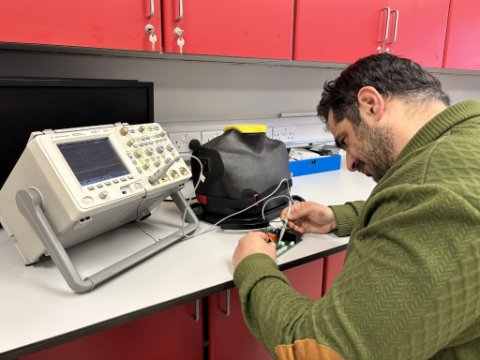Atlantic Technological University’s (ATU) Wireless Sensor Applied Research (Wisar) Lab has been selected for a European Space Agency (ESA) funded project aimed at enhancing the communication capabilities of cubesats.
Appointed for the project by Silicon Austria Labs, Wisar – a lab specialising in wireless embedded systems and software solutions – will integrate a hybrid beam-steering system by designing a passive antenna to enhance the miniature satellite’s ability to communicate.
Aptly titled ‘Enhancing CubeSat Communication: Beam Steering Antenna Systems,’ the project will also assess the cubesat’s existing power constraints, miniaturisation, and integration challenges and investigate newer technology such as phased array systems.
Cubesats are a class of nanosatellites that use a standard size and form factor, measuring from its smallest size of 10 x 10 x 10cm or 1U, up to 12U. These small satellites have gained popularity due to their compact size, low weight and modular design, making them valuable tools for Earth observation, telecommunications, scientific research and education.
However, despite its advantages, cubesats face constraints in communication tech due to its limited power supply and coverage areas.
Integrating beam-steering technology into cubesat systems will “revolutionise small-satellite communications”, ATU said, contributing to the broader development of space technologies and paving the way for more efficient and adaptable small-satellite missions.
“This project represents a significant step forward in cubesat communication technology. By leveraging advanced beam-steering solutions, we aim to overcome key challenges in space-based communication, enhancing data transmission efficiency and reliability,” said Dr Nick Timmons, the director of Wisar Lab.
“Our collaboration with Silicon Austria Labs and the European Space Agency underscores the importance of innovation in satellite communications and we are excited to contribute to the future of space technology.”
Ireland has a small, but growing role in the space industry. According to Enterprise Ireland, 109 Irish companies were engaged with the ESA in 2023, being awarded more than €10m in ESA and industry co-funding.
While University College Dublin’s Dr David Murphy – the scientist behind Ireland’s first satellite – is leading another ESA-funded project that aims to put a Compton telescope in a number of cubesats, creating a ‘swarm’ of small satellites that can communicate with each other and share data.
Suhasini Srinivasaragavan
This article originally appeared on www.siliconrepublic.com and can be found here.
Appointed for the project by Silicon Austria Labs, Wisar – a lab specialising in wireless embedded systems and software solutions – will integrate a hybrid beam-steering system by designing a passive antenna to enhance the miniature satellite’s ability to communicate.
Aptly titled ‘Enhancing CubeSat Communication: Beam Steering Antenna Systems,’ the project will also assess the cubesat’s existing power constraints, miniaturisation, and integration challenges and investigate newer technology such as phased array systems.
Cubesats are a class of nanosatellites that use a standard size and form factor, measuring from its smallest size of 10 x 10 x 10cm or 1U, up to 12U. These small satellites have gained popularity due to their compact size, low weight and modular design, making them valuable tools for Earth observation, telecommunications, scientific research and education.
However, despite its advantages, cubesats face constraints in communication tech due to its limited power supply and coverage areas.
Integrating beam-steering technology into cubesat systems will “revolutionise small-satellite communications”, ATU said, contributing to the broader development of space technologies and paving the way for more efficient and adaptable small-satellite missions.
“This project represents a significant step forward in cubesat communication technology. By leveraging advanced beam-steering solutions, we aim to overcome key challenges in space-based communication, enhancing data transmission efficiency and reliability,” said Dr Nick Timmons, the director of Wisar Lab.
“Our collaboration with Silicon Austria Labs and the European Space Agency underscores the importance of innovation in satellite communications and we are excited to contribute to the future of space technology.”
Ireland has a small, but growing role in the space industry. According to Enterprise Ireland, 109 Irish companies were engaged with the ESA in 2023, being awarded more than €10m in ESA and industry co-funding.
While University College Dublin’s Dr David Murphy – the scientist behind Ireland’s first satellite – is leading another ESA-funded project that aims to put a Compton telescope in a number of cubesats, creating a ‘swarm’ of small satellites that can communicate with each other and share data.
Suhasini Srinivasaragavan
This article originally appeared on www.siliconrepublic.com and can be found here.


